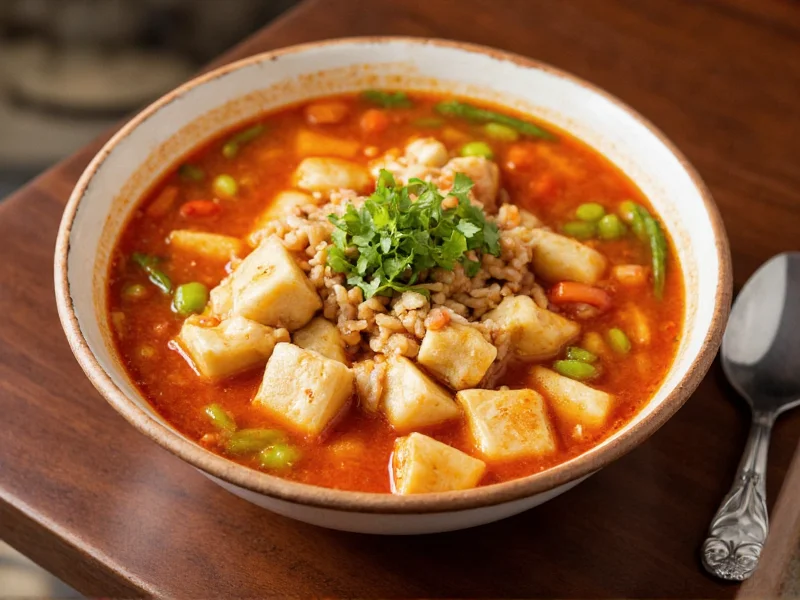The Essential Guide to Authentic Spicy Tofu Soup
Spicy tofu soup has gained global popularity for its perfect balance of heat, texture, and nutritional benefits. This Korean specialty, traditionally called Sundubu-jjigae, offers more than just comfort food—it represents centuries of culinary tradition adapted to modern kitchens worldwide.
Core Ingredients That Make the Difference
Creating exceptional spicy tofu soup requires understanding each component's role. Unlike basic tofu recipes, authentic versions rely on specific Korean ingredients that create the distinctive flavor profile:
| Ingredient | Function | Authentic Substitute |
|---|---|---|
| Soft tofu (Sundubu) | Provides delicate texture that absorbs flavors | Silken tofu (not firm) |
| Gochugaru (Korean red pepper flakes) | Delivers complex heat without vinegar sharpness | Smoked paprika + pinch cayenne (compromise) |
| Dwenjang (fermented soybean paste) | Adds umami depth and richness | Miso paste + soy sauce (2:1 ratio) |
| Anchovy-kelp broth | Creates foundational savory base | Vegetable broth + dried shiitake mushrooms |
Step-by-Step Preparation for Perfect Results
Follow these professional techniques to elevate your spicy tofu soup from ordinary to extraordinary:
Broth Foundation (10 minutes)
Start with a proper broth—this makes or breaks your spicy tofu soup. For authentic Korean spicy tofu soup, simmer dried kelp and anchovies for 20 minutes, then strain. This creates the essential umami base that distinguishes authentic recipes from simplified versions. Vegetarian? Soak dried shiitake mushrooms in hot water for 30 minutes instead.
Flavor Base Development (5 minutes)
Heat sesame oil in your pot, then sauté minced garlic and ginger until fragrant. Add 2-3 tablespoons gochugaru and 1 tablespoon doenjang, stirring constantly for 1-2 minutes to bloom the spices. This critical step unlocks complex flavors in your easy spicy tofu soup recipe that many home cooks skip.
Simmering Process (15 minutes)
Pour in your prepared broth and bring to a gentle simmer. Add sliced vegetables like zucchini and onions. When nearly tender, carefully add soft tofu cubes and your protein choice (common options include shrimp, clams, or thinly sliced pork). Never boil vigorously—this breaks the delicate tofu. For Korean spicy tofu soup with egg, crack a raw egg directly into the simmering pot during the last minute of cooking.
Regional Variations Worth Trying
While Korean spicy tofu soup remains the most popular version, regional adaptations offer exciting alternatives:
- Sichuan-style: Features mala (numbing-spicy) profile with Sichuan peppercorns and doubanjiang
- Japanese agedashi-inspired: Lighter broth with kombu and shiitake, served with fried tofu
- Vegan Korean version: Uses mushroom broth and omits seafood for plant-based spicy tofu soup
- Thai-inspired: Incorporates lemongrass, galangal, and coconut milk for tropical notes
Pro Tips for Restaurant-Quality Results at Home
Master these techniques to perfect your healthy spicy tofu soup:
- Tofu selection matters: Use extra-soft or silken tofu (not firm) for authentic texture that melts in your mouth
- Heat control is crucial: Maintain a gentle simmer, never a rolling boil, to preserve tofu integrity
- Layer flavors properly: Bloom spices in oil before adding liquid to maximize flavor extraction
- Finish with freshness: Stir in chopped green onions and a drizzle of sesame oil just before serving
- Adjust heat gradually: Add gochugaru in increments, tasting as you go—Korean red pepper varies in intensity
Serving Traditions and Pairings
Authentic spicy tofu soup always serves in a stone or thick ceramic pot that retains heat. Traditional Korean presentation includes:
- Steaming hot, bubbling vigorously when it arrives at the table
- Accompanied by steamed rice (never served in the same bowl)
- Complemented by kimchi and banchan (side dishes)
- Served with a spoon and chopsticks for proper eating technique
For Western tables, consider pairing spicy tofu soup with jasmine rice and a crisp cucumber salad to balance the heat. The best time to enjoy this dish? During colder months for comfort, or whenever you need a metabolism-boosting, protein-rich meal that's ready in under 30 minutes.
Troubleshooting Common Issues
Even experienced cooks encounter challenges with spicy tofu soup. Here's how to solve frequent problems:
- Tofu breaking apart: Use extra-gentle stirring with a wide spoon and maintain proper simmer temperature
- Bland broth: Increase depth by toasting aromatics longer or adding a splash of fish sauce
- Too spicy: Balance with a teaspoon of sugar or a dollop of plain yogurt when serving
- Watery consistency: Simmer uncovered for additional 5-7 minutes to reduce and concentrate flavors
- Lacking umami: Add a small piece of dried kombu to the simmering broth











 浙公网安备
33010002000092号
浙公网安备
33010002000092号 浙B2-20120091-4
浙B2-20120091-4